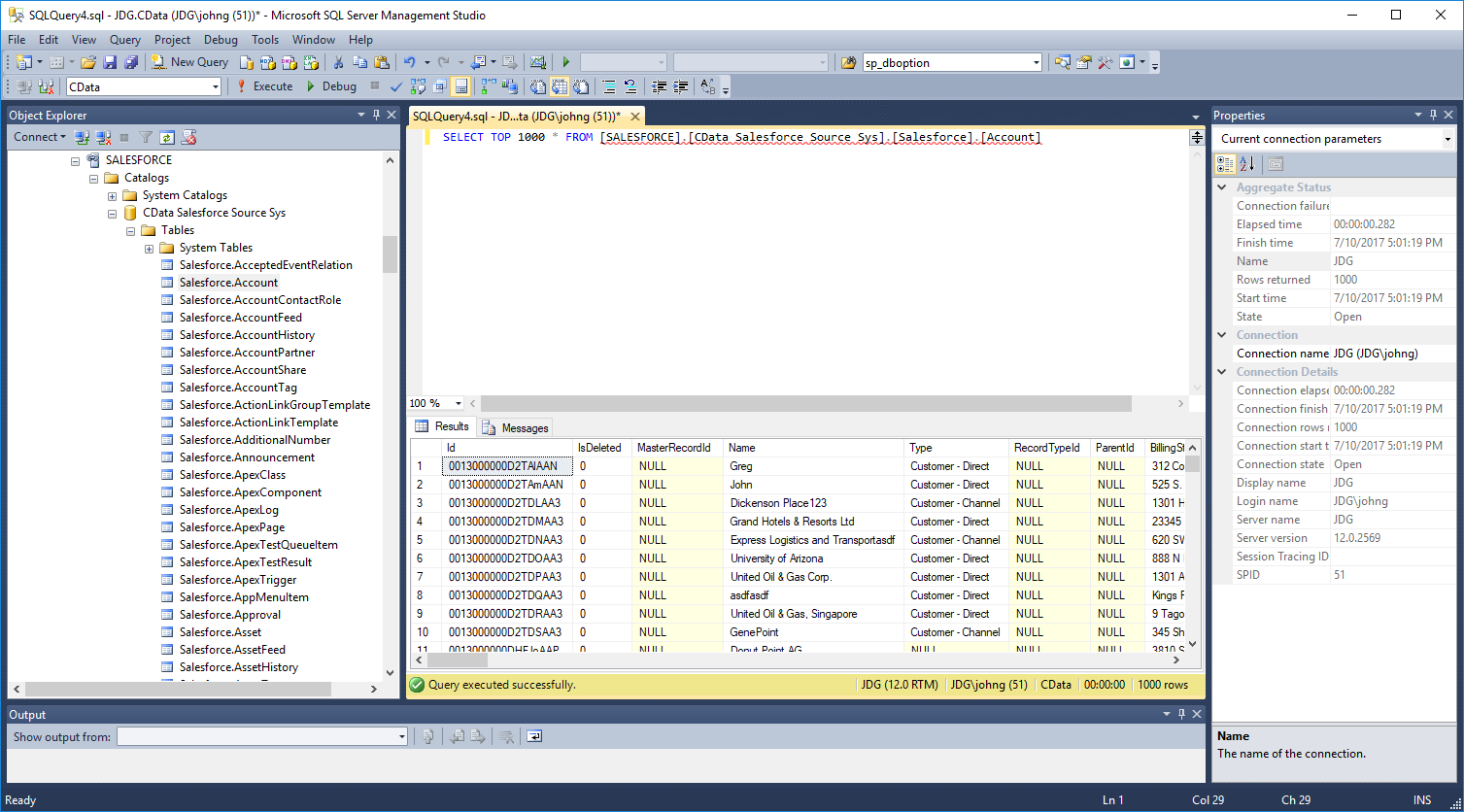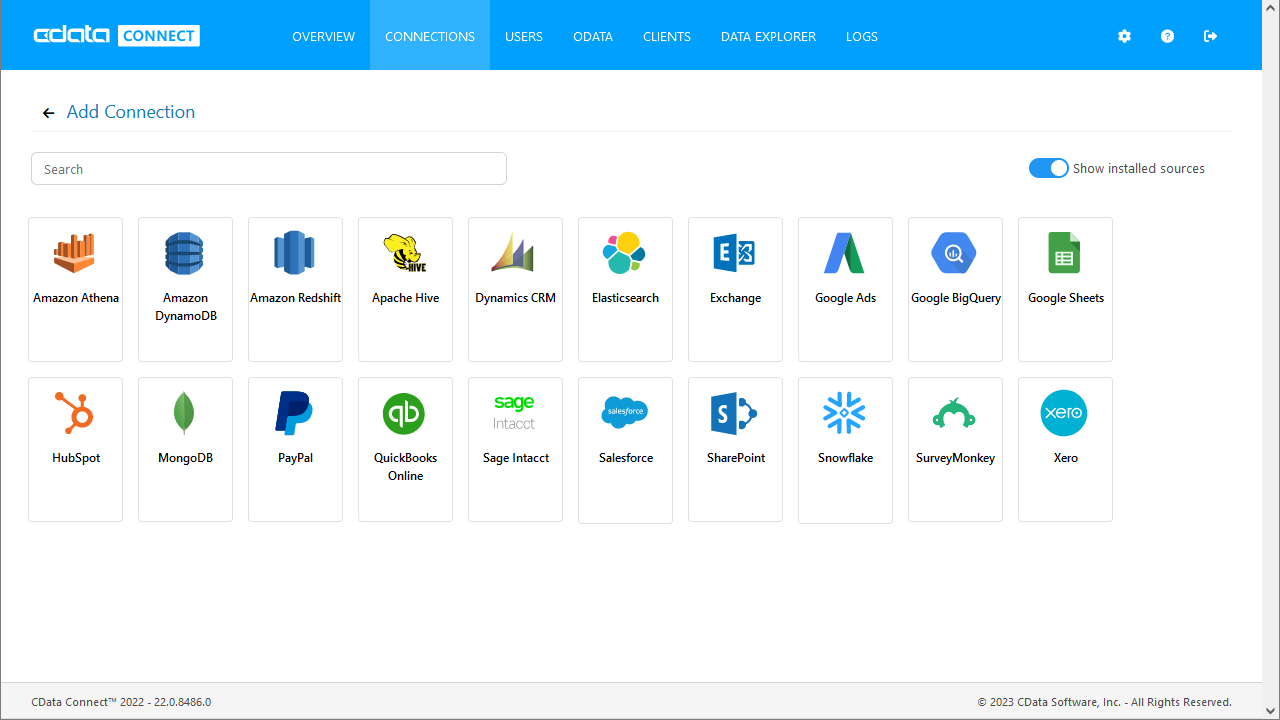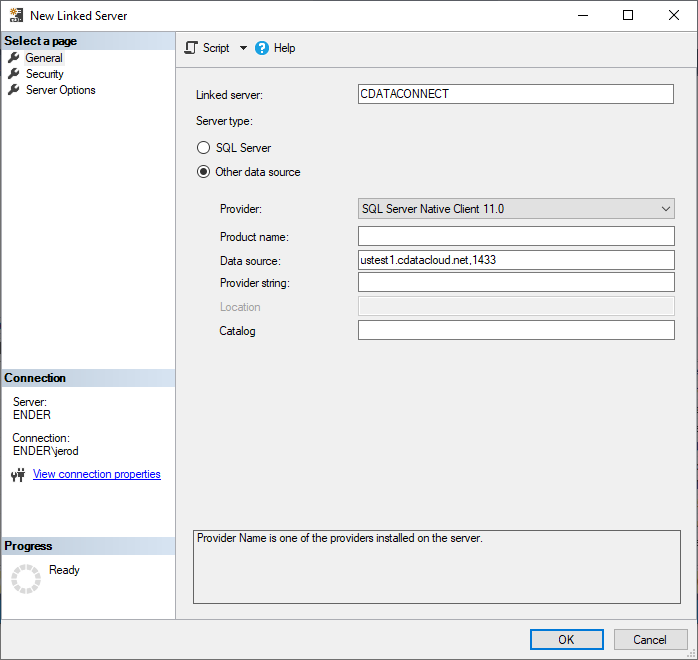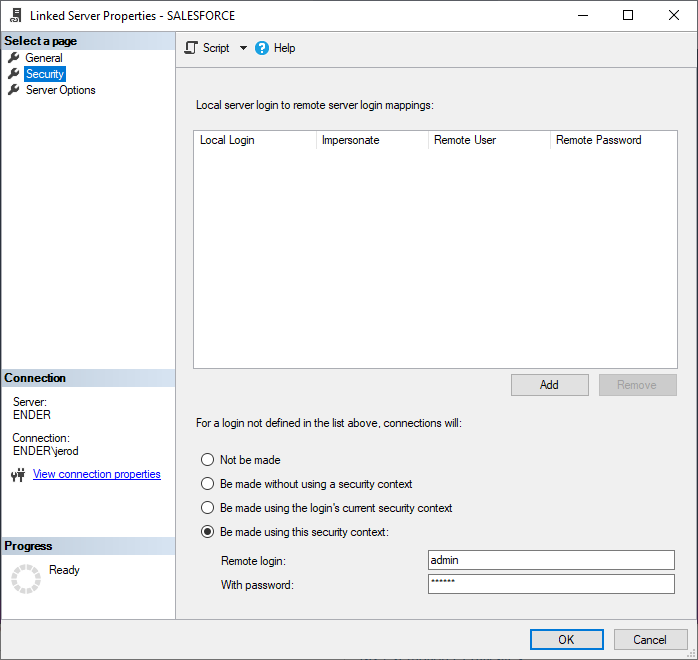Discover how a bimodal integration strategy can address the major data management challenges facing your organization today.
Get the Report →Connect to Teradata Data as a Linked Server
Use CData Connect to set up a linked server for Teradata data.
You can use CData Connect to set up a linked server for Teradata data. After you configure CData Connect, you can use the UI in SQL Server Management Studio or call stored procedures to create the linked server. You can then work with Teradata data just as you would a linked SQL Server instance.
CData Connect provides a pure SQL interface for Teradata, allowing you to easily integrate with live Teradata data in SQL Server — without replicating the data. Connect looks exactly like another SQL Server database and uses optimized data processing out of the box to push all supported SQL operations (filters, JOINs, etc) directly to Teradata, leveraging server-side processing to quickly return Teradata data.
Create a Virtual SQL Database for Teradata Data
CData Connect Server uses a straightforward, point-and-click interface to connect to data sources and generate APIs.
- Log into Connect Server and click Connections.
![Adding a connection]()
- Select "Teradata" from Available Data Sources.
-
Enter the necessary authentication properties to connect to Teradata.
To connect to Teradata, provide authentication information and specify the database server name.
- User: Set this to the username of a Teradata user.
- Password: Set this to the password of the Teradata user.
- DataSource: Specify the Teradata server name, DBC Name, or TDPID.
- Port: Specify the port the server is running on.
- Database: Specify the database name. If not specified, the default database is used.
![Configuring a connection (SQL Server is shown).]()
- Click Save Changes
- Click Privileges -> Add and add the new user (or an existing user) with the appropriate permissions.
Create a Linked Server for Teradata Data
After you have configured and started the daemon, create the linked server and connect. You can use the UI in SQL Server Management Studio or call stored procedures.
Create a Linked Server from the UI
Follow the steps below to create a linked server from the Object Explorer.
- Open SQL Server Management Studio and connect to an instance of SQL Server.
- In the Object Explorer, expand the node for the SQL Server database. In the Server Objects node, right-click Linked Servers and click New Linked Server. The New Linked Server dialog is displayed.
- In the General section, click the Other Data Source option and enter the following information after naming the linked server:
- Provider: Select the SQL Server Native Client Provider that corresponds to your version of SQL Server. For example, SQL Server Native Client 11.0.
Data Source: Enter the host and port, separated by a comma, where the TDS remoting service is running.
Note that a value of "localhost" in this input refers to the machine where SQL Server is running, so be careful if you create a linked server in Management Studio on a different machine.
- Catalog: Enter the CData system DSN, CData Teradata Sys.
![Linked Server properties. (SQL Server is shown.)]()
-
In the Security section, select the option to have the connection "made using this security context" and enter the username and password of a user you created in the Users tab of the SQL Gateway.
![A user known to the daemon in the Linked Server security properties.]()
Create a Linked Server Programmatically
In addition to using the SQL Server Management Studio UI to create a linked server, you can use stored procedures. The following inputs are required:
- server: The linked server name.
- provider: Enter "SQLNCLI" for the SQL Server Native Client Provider.
datasrc: The host and port, separated by a comma, where the service is running.
Note that a value of "localhost" in the datasrc input refers to the machine where SQL Server is running, so be careful if you create a linked server in Management Studio on a different machine.
- catalog: Leave this empty.
- srvproduct: Enter the product name of the data source; this can be an arbitrary value like "CData Connect" or an empty string.
Follow the steps below to create the linked server and configure authentication to the SQL Gateway:
-
Call sp_addlinkedserver to create the linked server:
EXEC sp_addlinkedserver @server='CDataConnect', @provider='SQLNCLI', @datasrc='< MachineIPAddress >,1434', @catalog='', @srvproduct=''; GO -
Call the sp_addlinkedsrvlogin stored procedure to allow SQL Server users to connect with the credentials of an authorized user of the service. Note that the credentials you use to connect to the service must specify a user you configured on the Users tab of the SQL Gateway.
EXEC sp_addlinkedsrvlogin @rmtsrvname='CDataConnect', @rmtuser='< CData Connect user >', @rmtpassword='< CData Connect password >', @useself='FALSE', @locallogin=NULL; GO
Connect from SQL Server Management Studio
Since CData Connect provides a virtual SQL Server interface, there is no further configuration needed to work with your Teradata data directly from SQL Server. Simply execute queries against CData Connect just like you would any other Linked Server.
Execute Queries
You can now execute queries to the Teradata linked server from any tool that can connect to SQL Server. Set the table name accordingly:
SELECT * FROM [linked server name].[CData Teradata Sys].[Teradata].[NorthwindProducts]

SQL Access to Teradata Data
At this point, you have a direct connection to live Teradata data from your SQL Server instance. You can work with live Teradata data just like you would any other SQL Server database, with no need to replicate the data. For more information on gaining SQL access to data from more than 100 SaaS, Big Data, and NoSQL sources, refer to our CData Connect page.









